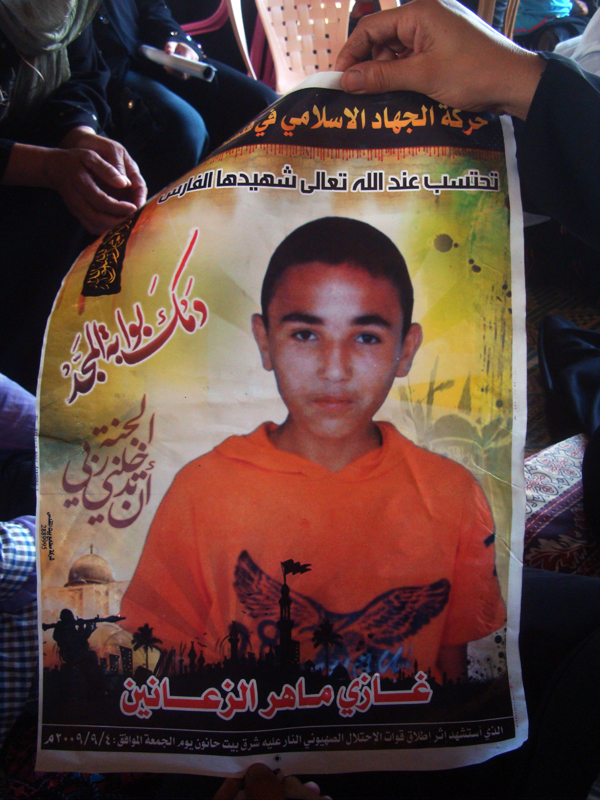On Tuesday evening, December 28, 19-year-old Hassan Mohammed Qedeh was killed by the Israeli military in the village of Khoza’a, east of the southern Gaza city of Khan Younis. According to the Israeli forces, and subsequently repeated by various media outlets, he was a resistance fighter. However, witnesses in the area, as well as relatives, have confirmed that he had civilian status at the time when he was killed. Sometime before sunset, Hassan had gone into the area of the border where an Apache had killed two of his relatives, Issa Abu Rok and Muhammad An-Najjar, two nights before, on December 26—both of them members of the armed resistance. According to his brother Ahmed Qedeh, Hassan ventured into the area to examine the place where his relatives had died. Ahmed says that a sniper sitting in a jeep alongside the border shot Hassan in the leg.
Ahmed added, “Hassan treated himself, while the IDF let him bleed slowly for the subsequent two hours, preventing any emergency vehicles, or his friends, from reaching him. Afterward, they shot munitions from a border-area tank, decapitating him.” He explained that “the area where they killed my brother is flat, free of any obstacles that could have blocked their view. The soldiers must have clearly seen that Hassan was a civilian, without any weapons, and shot anyway.”
According to Ahmed, five of Hassan’s friends repeatedly attempted to save Hassan, but came under heavy fire, and were unable to do so. Eventually they were shelled with a kind of gas bomb which caused them to faint.
According to United Nations figures, 59 Palestinians have been killed in Gaza by the IDF this year, 24 of them civilians. The number of wounded has been ten times that—220. And the count rises daily.
Hassan’s uncle, Abd Alazeer Yousef Abu Rjila’a, adds that the Israeli army came back to the crime site on the night of the 29th with a bulldozer that demolished 4 dunams of farming land. The man has not only lost three family members in a few days, but has lost his main source of income: most of his olive trees are uprooted and the water tank is destroyed. The man tried to reach his land twice on December 30th, but was forced to keep away as the army fired bullets at him to ward him off.
“Three families are dependent on me and that area: it’s our only source of income. I was already suffering, both psychologically and physically; I have high blood pressure and asthma, but now I can’t even reach my land, so how can I bring food to the table?” says Abd Alazeer Youssef Abu Rjila.
Updated on January 3, 2011
Ahmed added, “Hassan treated himself, while the IDF let him bleed slowly for the subsequent two hours, preventing any emergency vehicles, or his friends, from reaching him. Afterward, they shot munitions from a border-area tank, decapitating him.” He explained that “the area where they killed my brother is flat, free of any obstacles that could have blocked their view. The soldiers must have clearly seen that Hassan was a civilian, without any weapons, and shot anyway.”
According to Ahmed, five of Hassan’s friends repeatedly attempted to save Hassan, but came under heavy fire, and were unable to do so. Eventually they were shelled with a kind of gas bomb which caused them to faint.
According to United Nations figures, 59 Palestinians have been killed in Gaza by the IDF this year, 24 of them civilians. The number of wounded has been ten times that—220. And the count rises daily.
Hassan’s uncle, Abd Alazeer Yousef Abu Rjila’a, adds that the Israeli army came back to the crime site on the night of the 29th with a bulldozer that demolished 4 dunams of farming land. The man has not only lost three family members in a few days, but has lost his main source of income: most of his olive trees are uprooted and the water tank is destroyed. The man tried to reach his land twice on December 30th, but was forced to keep away as the army fired bullets at him to ward him off.
“Three families are dependent on me and that area: it’s our only source of income. I was already suffering, both psychologically and physically; I have high blood pressure and asthma, but now I can’t even reach my land, so how can I bring food to the table?” says Abd Alazeer Youssef Abu Rjila.




